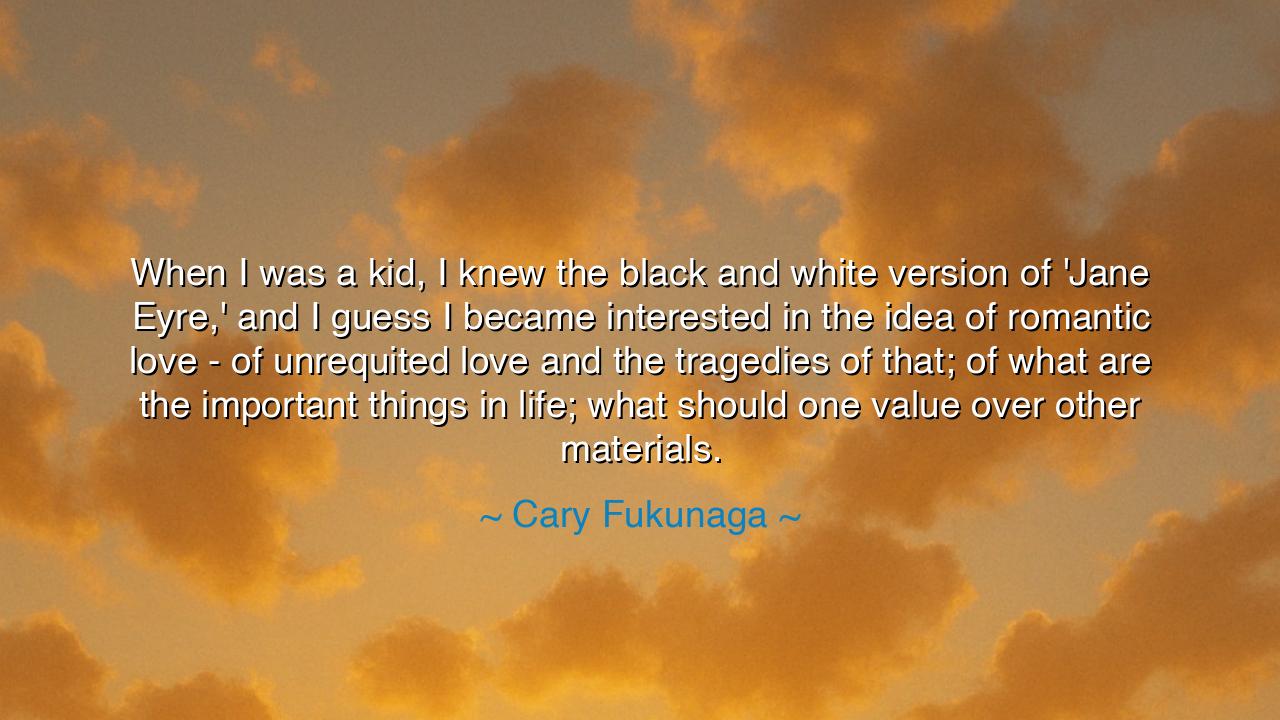
When I was a kid, I knew the black and white version of 'Jane
When I was a kid, I knew the black and white version of 'Jane Eyre,' and I guess I became interested in the idea of romantic love - of unrequited love and the tragedies of that; of what are the important things in life; what should one value over other materials.






In the words of Cary Fukunaga, there is a reflection both tender and searching: “When I was a kid, I knew the black and white version of Jane Eyre, and I guess I became interested in the idea of romantic love—of unrequited love and the tragedies of that; of what are the important things in life; what should one value over other materials.” Here is not merely a boy’s fascination with a film, but the awakening of a soul to the eternal questions: what is love, what is loss, and what endures when the illusions of the world fade.
The ancients spoke often of this mystery. They told of Orpheus, whose love for Eurydice drove him to descend into the underworld, only to lose her again through a tragic glance. They told of Antigone, whose devotion led her to sacrifice herself for what she held sacred. These tales, like the story of Jane Eyre, stir the heart because they remind us that love, when pure, is often shadowed by loss, and that from this tension comes wisdom. To be drawn to unrequited love as Fukunaga was, even as a child, is to feel the deep pull of the human story—the ache that teaches us what truly matters.
The tale of Jane Eyre itself is one of resilience, longing, and the triumph of inner worth over outward splendor. It is not a love story built on riches or appearances, but on the recognition of two souls, tested by secrecy, heartbreak, and moral struggle. For a child to witness such a tale is to learn early that romantic love is not always easy, nor always rewarded, but that its trials reveal what is essential. From these early impressions, Fukunaga grasped that values—not materials—are the compass of a life worth living.
History gives us examples of this same awakening. Consider Mahatma Gandhi, who in his youth was drawn to stories of virtue and sacrifice. Though not tales of passion in the romantic sense, they planted in him the conviction that some things—truth, justice, devotion—were worth more than wealth or comfort. Later, when he renounced material pursuits, it was this conviction that gave his life power. In the same way, Fukunaga’s reflection reminds us that even romantic tragedies instruct us in what outlasts fleeting gain.
The deeper meaning of his words is this: that love, whether fulfilled or unrequited, whether joyous or tragic, teaches the soul to discern what matters most. The pain of loss sharpens the vision, stripping away illusions of wealth, status, or possession. In the end, what endures is not what can be held in the hand, but what lingers in the heart. The tragedies of love do not destroy—they refine, they reveal, they remind us that beauty often shines most brightly in struggle.
The lesson, then, is clear: let stories of love and loss guide you. Do not dismiss them as fanciful or old-fashioned, for they are the mirrors of the soul. Learn from them that possessions fade, but loyalty, courage, and devotion endure. When life tempts you to choose between material gain and the truth of the heart, remember the example of Jane Eyre, and remember the wisdom Fukunaga glimpsed as a boy: choose what cannot be bought, choose what is eternal.
Therefore, O listener, do not fear romantic love, even when it is unfulfilled. Do not despise tragedy, for it is often the teacher of your highest values. Embrace the lessons of story, of art, of ancient and modern voices alike, for they remind us of the hierarchy of life: materials are fleeting, but love, integrity, and devotion to what is right endure beyond time. And in learning this, you too will discover what to truly value in your own journey.






AAdministratorAdministrator
Welcome, honored guests. Please leave a comment, we will respond soon